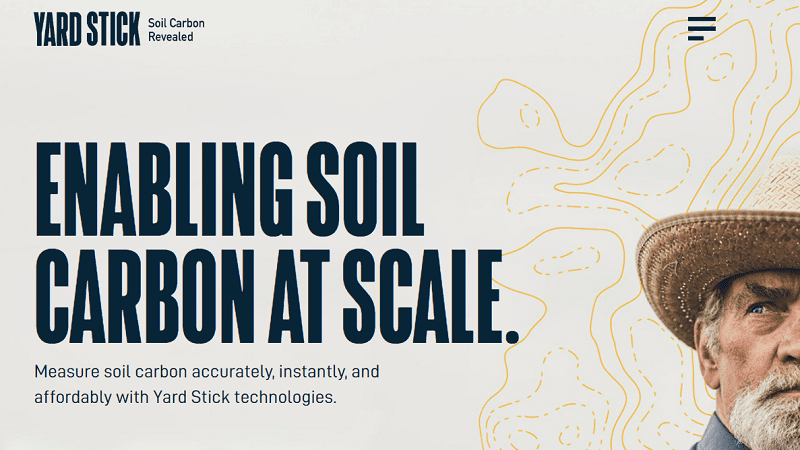
CAMBRIDGE, Mass.–(BUSINESS WIRE)–Yard Stick PBC, a seed-stage startup developing a low-cost soil carbon measurement technology, announced today that six partner projects were selected for a total of $225 million in investment from the USDA’s Partnerships for Climate-Smart Commodities initiative. As the selected projects’ soil carbon stock quantification partner, Yard Stick is earmarked to receive an estimated $18 million in funding.
Yard Stick is commercializing a soil spectroscopy technology originally developed by Dr. Cristine Morgan, now the Chief Scientific Officer at The Soil Health Institute. Yard Stick’s handheld hardware and data platform will reduce the cost of measuring soil carbon by more than 90 percent. Combined with improved analytical rigor compared to current measurement methods, this dramatic drop in the cost of measurement, reporting, and verification (MRV) for soil carbon sequestration represents a major boost in the economic viability of evidence-based climate-positive agriculture.
“Our partners chose Yard Stick for soil carbon stock quantification because they see what our platform’s low cost and scientific rigor can do to scale the groundbreaking potential of widespread soil carbon sequestration,” said Chris Tolles, co-founder and CEO of Yard Stick. “We’re thrilled that the USDA agrees and has selected these projects for investment. Our purpose is to show the transformative potential of our partners’ climate-smart agricultural practices, and this grant program will accelerate our mission tremendously.”
Leaders in sustainable agriculture across academia and business like Organic Valley, Texas A&M, South Dakota State University, General Mills, Stonyfield Organic and others will rely on Yard Stick’s low-cost, high precision MRV technology to maximize the potential these USDA grants provide for farmers and ranchers.
“At Organic Valley, we’re so excited to work with Yard Stick to advance the state of soil carbon measurement innovation,” said Nicole Rakobitsch, Director of Sustainability at Organic Valley. “We deeply share a mission to provide small family farms with technology to measure and show their great work on-farm. We have several hands-on examples of how grazing pastures can sequester carbon, and that work grows with this historic set of partnerships. We are honored by USDA’s selection of our program alongside Yard Stick and other great partners.”
Farmers and ranchers can capture carbon in their soils using a variety of well-established sustainable methods, including biochar or mineral fines, among others. The result not only improves soil quality and yields, but also sequesters carbon in the ground and prevents its return to the atmosphere as greenhouse gasses like carbon dioxide or methane, where it would contribute to global warming.
“At Global Clean Energy, sustainability is our focus,” Global Clean Energy CEO Richard Palmer said. “We are honored by the USDA’s approval of our Climate-Smart Commodities program, Climate-Smart Camelina, and proud to partner with Yard Stick in improving our green energy future through innovative solutions.”
Companies looking to reach net-zero emissions help fund projects that remove carbon from the atmosphere to offset their own emissions. With approximately 915 million acres of farmland in the United States alone, there is a huge win-win-win opportunity for farmers to receive extra compensation for carbon sequestration while they improve their soils and fight back against climate change. The bottleneck of soil carbon removal at scale is measurement; Yard Stick’s low-cost, high precision technology is the innovation that unlocks this opportunity for farmers and ranchers alike.
About Yard Stick
Yard Stick’s mission is to enable gigaton-scale agricultural carbon sequestration via scalable, trustworthy measurement solutions. We are the measurement backbone of soil carbon. Our R&D work is funded by a generous ARPA-E grant as well as by leading climate investors such as Breakthrough Energy Ventures. Our founding team features some of the most highly-regarded soil scientists in the world, including Dr. Cristine Morgan of the Soil Health Institute, and is based in Cambridge, Mass. For more information, visit useyardstick.com.










